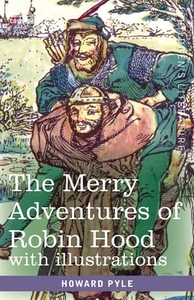Take a photo of a barcode or cover
adventurous
inspiring
lighthearted
sad
adventurous
funny
inspiring
lighthearted
fast-paced
Plot or Character Driven:
Character
Strong character development:
N/A
Loveable characters:
Yes
Diverse cast of characters:
N/A
Flaws of characters a main focus:
N/A
Although this version of Robin Hood is apparently a departure from the traditional ballads (in them there was no "steal from the rich to give to the poor" - Robin was just a crook), it's the mythology that we know today. I was prompted to read it to see where the BBC Robin Hood series departed from the legends, and found no shortage there. The book itself is very enjoyable, once you get used to the language.
adventurous
funny
lighthearted
medium-paced
Amazingly, I seem to have got to nearly 30 years of age and not actually read the stories of Robin Hood and his band of Merry Men. I think because the character of him is so synonymous with Britain, you feel like you know the stories off by hear but in actual fact you don’t.
It was actually quite interesting to read all of the individual stories that make up the much larger legend of Robin Hood. To read about members of his band of outlaws that you know of, and those that you don’t.
What kind of took me by surprise in this retelling is that it was written in an old English style which was a little off putting at the beginning but if you don’t focus too much on the language you are able to kind of skim over it.
A nice trip down the path of nostalgia.
It was actually quite interesting to read all of the individual stories that make up the much larger legend of Robin Hood. To read about members of his band of outlaws that you know of, and those that you don’t.
What kind of took me by surprise in this retelling is that it was written in an old English style which was a little off putting at the beginning but if you don’t focus too much on the language you are able to kind of skim over it.
A nice trip down the path of nostalgia.
adventurous
medium-paced
Plot or Character Driven:
A mix
Strong character development:
No
Loveable characters:
N/A
Diverse cast of characters:
N/A
Flaws of characters a main focus:
N/A
This is gonna get kinda long, so...
There are 2669 editions of The Merry Adventures of Robin Hood listed in Goodreads, and yet I was unable to find the exact one I read, which is a 1940 Whitman Classics edition. I picked a 1955 Whitman Classics because I'm sure it's the same text, still officially titled as "The Merry Adventures of Robin Hood of Great Renown, in Nottinghamshire."
One interesting thing about this edition is that they kept Pyle's original wording from the 1883 version, with all the yons and prythees and quoths and wots, but put in bracketed "translations" when they thought it might be needed. I like this method. The kids reading it get the original text, but get a little help so it's not unfathomable.
I own another edition that also claims to be "The Merry Adventures of Robin Hood," but they've done a lot of editing, sometimes just a sentence but sometimes whole paragraphs or pages lopped out. More interestingly to me, I listened to part of an audio version that claimed to be "unabridged," and they were still loppng out huge chunks and changing a word here and there. I assume it's an "unabridged" audio of some later, edited, version.
Anyway, what was most fascinating to me about this book is all the things I learned about Robin Hood. I grew up on the Disneyfied, widely accepted version of Robin Hood as a great guy roaming the forests robbing the rich to give back to the poor - possibly a wronged nobleman whose lands had been taken by treachery. He defends the defenseless and wins the hand of his lady love, Maid Marian.
First off, the Robin Hood of the original ballads is just an outlaw, not an outlaw with a heart of gold but one who becomes an outlaw because he straight up murders 14 of the King's foresters for reneging on a bet. Then he roams the forest with his band of outlaws robbing the rich for his own gain.
This 1883 version by Pyle softened him up into an impetuous youth who did indeed kill (murder?) one King's forester after an altercation over a bet, but that guy shot at him first and Robin feels bad about it for the rest of his days so now it's okay, I guess? He also won the bet by shooting one of the King's deer, which is a big no-no but which he and his men do with impunity for the whole rest of the book.
This Robin spends this book encountering other young men who somehow best him in battle by brawn or by brains, and then he's so impressed that he invites them to come join his band for a fairly decent salary and three suits of Lincoln green a year. Apparently despite having to live as an outlaw this is a pretty sweet deal because every one of them takes him up on it, even if it means tossing aside their skilled trade. Sure, let's go party in the woods!
Robin and his men ARE kinder and gentler in this version and the local population loves them because they help out the poor and even a wronged nobleman. Robin is even pretty fair-minded with his victims, as he doesn't kill anyone and often takes only a portion of their money or goods and lets them keep some, and also gives some to charity. This is a much more appealing story and I totally get why it has become a staple of pop culture and endured for so long.
I DON'T know where some of the other usual elements got pulled from - other early ballads? Additional stories by Pyle? Maid Marian is mentioned ONCE in this book, and King John (the usurper) isn't in it at all; Robin has some dealings with King Henry with some help from Queen Eleanor (of Aquitaine, I guess?) and then Richard the Lionheart returns from the Crusades a la the Patrick Stewart version in Robin Hood: Men In Tights and all is forgiven, tra la la.
I think I will just stick with passing the Disney Robin Hood on to my kids, but I definitely learned a lot reading this book.
There are 2669 editions of The Merry Adventures of Robin Hood listed in Goodreads, and yet I was unable to find the exact one I read, which is a 1940 Whitman Classics edition. I picked a 1955 Whitman Classics because I'm sure it's the same text, still officially titled as "The Merry Adventures of Robin Hood of Great Renown, in Nottinghamshire."
One interesting thing about this edition is that they kept Pyle's original wording from the 1883 version, with all the yons and prythees and quoths and wots, but put in bracketed "translations" when they thought it might be needed. I like this method. The kids reading it get the original text, but get a little help so it's not unfathomable.
I own another edition that also claims to be "The Merry Adventures of Robin Hood," but they've done a lot of editing, sometimes just a sentence but sometimes whole paragraphs or pages lopped out. More interestingly to me, I listened to part of an audio version that claimed to be "unabridged," and they were still loppng out huge chunks and changing a word here and there. I assume it's an "unabridged" audio of some later, edited, version.
Anyway, what was most fascinating to me about this book is all the things I learned about Robin Hood. I grew up on the Disneyfied, widely accepted version of Robin Hood as a great guy roaming the forests robbing the rich to give back to the poor - possibly a wronged nobleman whose lands had been taken by treachery. He defends the defenseless and wins the hand of his lady love, Maid Marian.
First off, the Robin Hood of the original ballads is just an outlaw, not an outlaw with a heart of gold but one who becomes an outlaw because he straight up murders 14 of the King's foresters for reneging on a bet. Then he roams the forest with his band of outlaws robbing the rich for his own gain.
This 1883 version by Pyle softened him up into an impetuous youth who did indeed kill (murder?) one King's forester after an altercation over a bet, but that guy shot at him first and Robin feels bad about it for the rest of his days so now it's okay, I guess? He also won the bet by shooting one of the King's deer, which is a big no-no but which he and his men do with impunity for the whole rest of the book.
This Robin spends this book encountering other young men who somehow best him in battle by brawn or by brains, and then he's so impressed that he invites them to come join his band for a fairly decent salary and three suits of Lincoln green a year. Apparently despite having to live as an outlaw this is a pretty sweet deal because every one of them takes him up on it, even if it means tossing aside their skilled trade. Sure, let's go party in the woods!
Robin and his men ARE kinder and gentler in this version and the local population loves them because they help out the poor and even a wronged nobleman. Robin is even pretty fair-minded with his victims, as he doesn't kill anyone and often takes only a portion of their money or goods and lets them keep some, and also gives some to charity. This is a much more appealing story and I totally get why it has become a staple of pop culture and endured for so long.
I DON'T know where some of the other usual elements got pulled from - other early ballads? Additional stories by Pyle? Maid Marian is mentioned ONCE in this book, and King John (the usurper) isn't in it at all; Robin has some dealings with King Henry with some help from Queen Eleanor (of Aquitaine, I guess?) and then Richard the Lionheart returns from the Crusades a la the Patrick Stewart version in Robin Hood: Men In Tights and all is forgiven, tra la la.
I think I will just stick with passing the Disney Robin Hood on to my kids, but I definitely learned a lot reading this book.
“The Merry Adventures of Robin Hood” is a really fun collection of stories that I enjoyed reading. I took off two stars for a few reasons:
The epilogue felt strangely morbid and drawn out (First you expect Robin to die in battle, then from a fever, then from bleeding out, and then I guess from blood loss and weakness, bu not before one last kick-ass moment where he fires an arrow at the place he wants to be buried).
The female characters are almost nonexistent (Maid Marian maybe gets one or two mentions in the whole book).
The word “Merry” is said 4000 times. Like before I read this book 9 thought I had a decent handle on what that word meant, but now I don’t know what to think.
So if you like classic adventure stories about noble heroes, and you really like the word “merry”, check this book out. Otherwise, it might not be your pint of ale.
The epilogue felt strangely morbid and drawn out (First you expect Robin to die in battle, then from a fever, then from bleeding out, and then I guess from blood loss and weakness, bu not before one last kick-ass moment where he fires an arrow at the place he wants to be buried).
The female characters are almost nonexistent (Maid Marian maybe gets one or two mentions in the whole book).
The word “Merry” is said 4000 times. Like before I read this book 9 thought I had a decent handle on what that word meant, but now I don’t know what to think.
So if you like classic adventure stories about noble heroes, and you really like the word “merry”, check this book out. Otherwise, it might not be your pint of ale.
TL;DR: A winding account of someone running around the countryside.



